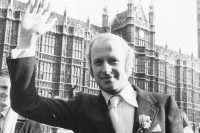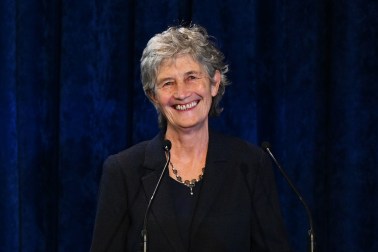Few things in history can be more worth thinking about than the first world war, so in a way one welcomes the government’s plan for extensive centenary commemorations. And I do not agree with the critics that part of the purpose should be to blame the Germans: such blame is not a task for government. The bigger worry is surely twofold. One is that, over the planned four years, the commemorations will dissipate their energies in cultural trench warfare and get muddled up with the normal (and excellent) patterns of Remembrance. The other is that they will resemble those semi-apologies about any violent death in our history which have become a cheap way for political leaders to show themselves more enlightened than their predecessors. This lavish attention on the Great War contrasts with the government’s refusal to commemorate the bicentenary, in 2015, of the battle of Waterloo. The bicentenary campaign, Waterloo 200, which is preparing its own celebrations, went to see the Culture Minister Ed Vaizey (why should war be departmentally downgraded to DCMS?), but he won’t help. Yet Waterloo was truly remarkable. A British leader, Wellington, successfully forged a European coalition army (only 25 per cent British), and won a victory which gave rise to a whole new order of nation states. Typically, the Belgian authorities are happily spending money to celebrate the battle that took place on their soil, while ours try to avoid the subject.
The news that the IMF, in its guise as ‘Greece’, has suddenly stopped the Greek state broadcasting system to save money is an encouraging precedent. If we really want — as we should — what Tony Benn once called ‘an irreversible shift of wealth and power in favour of ordinary working people’, the government should abolish the BBC licence fee overnight.
In Washington recently, and hyped up to give interviews about my Thatcher biography, I received a very early call on my mobile. Rather than being some top US media outlet, it was William De La Warr, East Sussex’s only (so far as I know) earl. ‘Our wonderful parson is retiring,’ he told me from thousands of miles away, ‘and, as the patron of the living, I want to get the right man. Where should I advertise?’ I blearily suggested Horse and Hound, which is what my late cousin, Johnny Pryor, used for this purpose. But we ruefully agreed that it would probably pass unnoticed there. So we settled on The Spectator. Last month, an advertisement duly appeared in these pages, under ‘recruitment’, for the benefice of St Michael and All Angels, Withyham (‘Accommodation is provided in a fine Georgian rectory’). But so far, not one single taker. What is wrong with Spectator readers?
I caught up with the story of this failed advertisement as Lord De La Warr and I found ourselves in the same pew in St Lawrence church, Castle Rising, Norfolk. We were present for the wedding of Annabel Howard and David (D.W.) Wilson. The bride, the daughter of Corty and Greville Howard, is a woman of ethereal beauty and sweet nature with whom I have ridden across the Kenyan savannah. The groom is a brilliant young Canadian novelist (‘epic tale of loyalty, betrayal …describes interpersonal headbutting taking place in the early 1970s’ — National Post). The lovely service was essentially Book of Common Prayer with a bit of 1928 softening. I listened carefully to ‘the causes for which Matrimony was ordained’. They are 1. Procreation of children. 2. Sexual restraint (for what the Prayer Book calls ‘such persons as have not the gift of continency’). 3. ‘…the mutual society, help, and comfort, that the one ought to have of the other’. The word ‘love’ is not mentioned. In the debates about same-sex marriage, love is always produced as the trump card — ‘I love someone of my own sex: therefore I should be able to marry him or her.’ This is a non-sequitur. Love is a key duty of marriage — the vows emphasise it strongly — but the fact that two people love one another constitutes no automatic right to marry. Marriage is not mere narcissism à deux. Unfortunately, modern heterosexual society has given the impression that it is, so gays want to claim their slice of the action.
Since one’s attitude to homosexual acts is now considered the main way of judging whether a person is civilised, one must salute those in public life who defy this. To oppose gay ‘equality’ today is roughly as brave as it was to be publicly homosexual in, say, 1970: your position is not absolutely illegal, but it is perilous. Given how wobbly many Anglicans are on the issue, the Archbishop of Canterbury and the Bishop of London should be commended for their courage in the House of Lords debate. The Chief Rabbi, Lords Sacks, should be reproved. Orthodox Judaism is absolutely clear on this issue, but Lord Sacks absented himself. Perhaps he feels that Jews should not intervene in secular society. But if such a key social institution as marriage is beyond his responsibility, why did he agree to become a legislator?
The most laughable argument for the same-sex cause was that advanced by Lord Browne of Madingley, the former chief executive of BP. ‘Gay marriage,’ he told his fellow peers, ‘is a matter of strategic importance for British business.’ Really? Would we sell more to Saudi Arabia, Nigeria, Russia or China if our top male executives turned up with their husbands for business dinners?
Alexander Chancellor (Long life, 8 June) hates the ‘smug, self-righteous look’ of people riding horses on country roads. I know what he means, but I think he misdiagnoses. The riders are frightened. It is much more alarming walking along a road on a horse than it is jumping hedges. This is because the tarmac is hard if you hit your head on it, the dangers are unpredictable, and many motorists think (erroneously) that horses have no legal right to travel on roads at all. Our ‘smug’ look is actually a grimace of fear twisted into politeness.






Comments